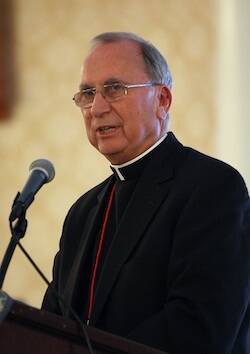The annual Labor Day statement from the U.S. Conference of Catholic Bishops may prove notable this year because of observations that in the past would hardly raise an eyebrow. It includes a thorough reiteration of the U.S. church’s historical support of organized labor and an acknowledgment of the American labor movement’s intricate relationship with the U.S church.
Penned by Bishop Stephen Blaire of Stockton, Calif., “Human Costs and Moral Challenges of a Broken Economy” notes the long tradition of support for organized labor in Catholic social teaching. Since “Rerum Novarum” in 1891, “the Church has consistently supported efforts of workers to join together to defend their rights and protect their dignity,” Bishop Blaire writes.
The tension surrounding the issue of the collective bargaining rights of public sector workers across the country was an obvious focus of the statement. Bishop Blaire notes “some efforts, as part of broader disputes over state budgets, to remove or restrict the rights of workers to collective bargaining as well as limit the role of unions in the workplace.” He commends bishops in Wisconsin, Ohio and elsewhere who outlined Catholic teaching on worker rights, “suggesting that difficult times should not lead us to ignore the legitimate rights of workers.”
Although the church did not endorse “every tactic of unions or every outcome of collective bargaining,” Bishop Blaire writes that it still affirms “the rights of workers in public and private employment to choose to come together to form and join unions, to bargain collectively, and to have an effective voice in the workplace.”
Perhaps anticipating an outburst of criticism from certain quarters of the church that have become doubtful about the legitimacy of the social role of organized labor, Bishop Blaire adds, “This does not mean every outcome of bargaining is responsible or that all actions of particular unions—or for that matter employers—merit support. Unions, like other human institutions, can be misused or can abuse their role.”
The annual message arrives at a difficult time for organized labor in the United States. The pensions, health benefits and collective bargaining rights of public sector workers are being challenged across the country during a period of continuing union decline. While they may still represent a little over 32 percent of public sector workers, unions represent just 6.9 percent of the private workforce and altogether just about 11 percent of the total U.S. workforce, far below their historic highs.
Bishop Blaire’s qualified renewal of vows with organized labor will no doubt be welcomed by unionized laypeople, even if it promotes teeth-grinding elsewhere. But further along in the statement is Bishop Blaire’s perhaps most poignant insight into the nation’s recent dilemmas related to the economy. “Sometimes economic troubles bring out the worst in us,” he wrote. “Uncertainty and fear compel us to fight for our own interests and to preserve our own advantages.”
How can Catholics interrupt such dysfunctional cycles? Bishop Blaire writes: “We can understand and act like we are part of one economy, one nation, and one human family.… We can clearly respect the legitimacy and roles of others in economic life: business and labor, private enterprise and public institutions, for-profit and nonprofit, religious and academic, community and government.... We can look for common ground and seek the common good.”








